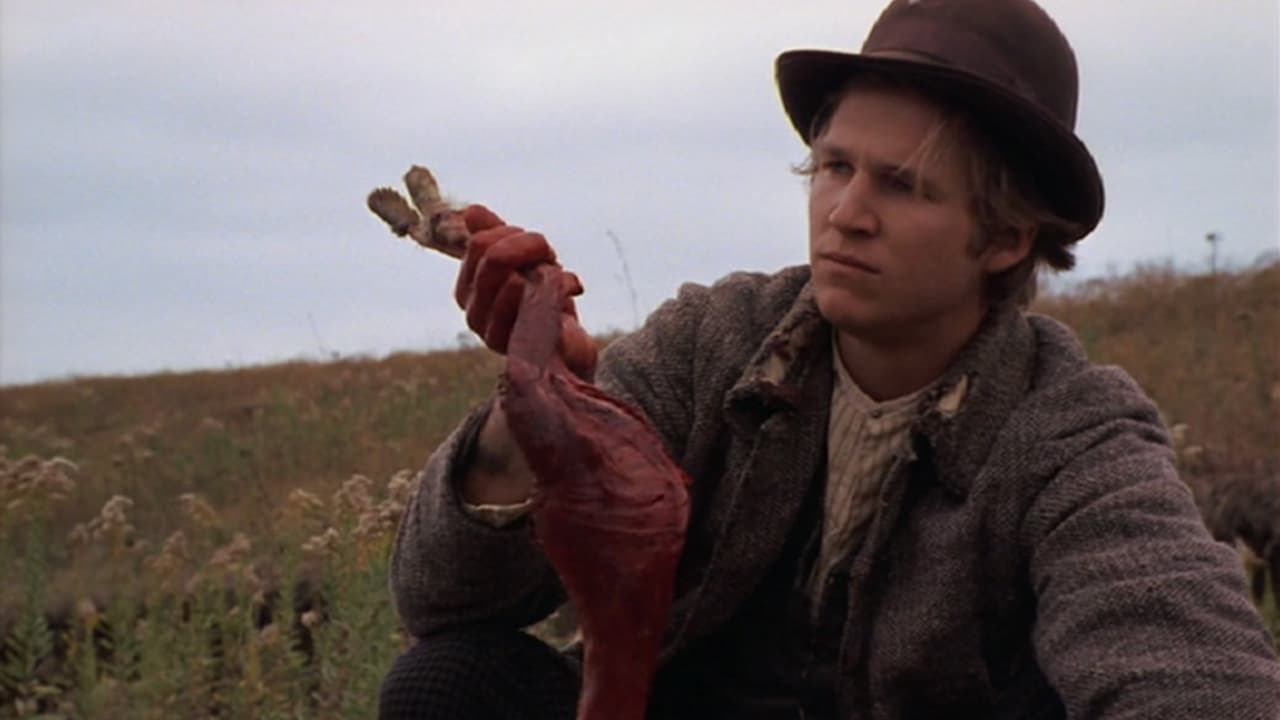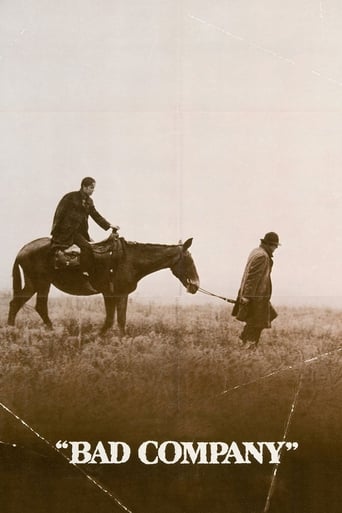

Great title aside, "Bad Company" undermines expectations in a couple of ways. It's a western, but of the revisionist sort (indeed, it's no rollicking escapism) and it feels like a coming-of-age story, but seems to be somewhat opposed to that, too. It's a curious thing: I approached this movie as a Jeff Bridges fan, and came away better appreciating Barry Brown instead. Which makes sense, it's his story. But he embodied the well-behaved Midwestern Christian so perfectly.There's a Mark Twain undercurrent running through all of this, but it's not a straightforward tale on the river. It's complicated and seeing how far Brown has fallen by the end credits is the real reason there's any shock value to this (even with the "Butch Cassidy" freeze-frame, which was kind of a disappointment). This movie isn't genre (re)defining but it scratches an itch. And even if you're not swept off your feet, there are high points; David Huddleston owns his scenes, those prairies certainly look good, and that tinkling piano score sticks with you.6/10
... View MoreRobert Benton's and David Newman's third screen writing collaboration—after 'Bonnie & Clyde' (1967) and 'There was a Crooked Man' (1970)—'Bad Company', though flawed, is still one of the better revisionist westerns of the Seventies. Helmed by Benton (his first directorial effort) and shot by Gordon Willis ('Klute'; 'The Godfather') in and around Emporia, Severy, and Neosho Rapids, Kansas, 'Bad Company' is a western, a road movie, a buddy film, and a coming-of-age story all rolled into one. According to press materials, the impetus for the story came out of Benton's recollections of his father and uncles in Waxahachie, Texas. Although his uncles exhibited "an enormous kind of chemistry for the illegal," his basically upstanding father worshiped his brothers nonetheless. Hence the movie's theme: "When you love someone you ultimately cross lines for them you never expected to cross in your life." After a son is killed at the Battle of Chickamauga (September 1863), a Greenville, Ohio couple hide their other son, Drew Dixon (Barry Brown) from union troops searching for draft evaders, give him $100 and his late brother's gold watch, and send him on his way toward the sparsely settled western territories where, presumably, he will be safe from the draft. Dixon's travels to St. Joseph, Missouri—the western edge of the Union and the eastern terminus of (the by then defunct) Pony Express—where he hopes to join a wagon train or board a stagecoach for Virginia City, Nevada (1,500 miles further west) and make his fortune as a silver prospector at the Comstock Lode. Stranded in St. Joseph, which is swarming with union soldiers, Dixon is accosted and robbed by Jake Rumsey (Jeff Bridges), another draft dodger who heads a small gang of young desperadoes. Though Drew Dixon is a naive young man from a pious, respectable background, he soon falls in with Jake Rumsey (i.e., "bad company") much in the same way that Oliver Twist fell in with Fagin and his pickpockets. Jake, Drew, and four other youths ride west through desolate country. Along the way a grizzled farmer heading back East sells his wife's sexual favors to the boys for eight dollars; the boys buy food from a farmer who holds a shotgun on them as they eat; they are robbed by a gang of outlaws; one boy is shot dead trying to steal a pie; another hops a stagecoach the band was trying to hold up; a pair of brothers (one of whom is played by a very young John Savage) hold Jake and Drew at gunpoint and take their horses but are later found hanging from a tree. The gang that previously robbed them attack Jake and Drew but this time they stand their ground and kill their assailants. Discovering that Drew faked a robbery to get into his gang, Jake knocks Drew unconscious, robs him, and leaves him to fend for himself in the wilderness. And on and on it goes. What started as a youthful adventure turns into an endless nightmare of paranoia, violence, predation, and betrayal in the savage Darwinian universe that was the Old West. In the end, the nominally pious Drew has transformed himself into an honest outlaw indistinguishable from Jake Rumsey. Though not big at the box office, the film earned good notices and inspired a hit song "Bad Company," by a hugely successful English rock group of the same name. A sad postscript: the movie's promising co-star, Barry Brown, struggled with alcoholism and drug addiction before committing suicide on June 25, 1978 at the age of 27. VHS (1998) and DVD (2002).
... View MoreReleased in 1972, "Bad Company" is an atypical Western about a young man from a Christian family (Barry Brown) who leaves home in Ohio and goes West to flee the Civil War draft. In Kansas he foolishly falls-in with the wrong crowd, led by Jeff Bridges, and things go from bad to worse. You know what the proverb says: "Bad company corrupts good character." This is a raw and realistic Western that shows the awful truth about naïve people in strange places and how easy it is to get on the wrong track. It's outstanding on every level.Star Barry Brown committed suicide in 1978, five years after the film was released. He came from a dysfunctional family and said, "The only time I'm not unhappy is when I'm acting." His sister committed suicide 20 years after his death.The film was shot in Kansas and runs 93 minutes.GRADE: A
... View MoreThe movie opens with a horse-drawn wagon parked in front of a house. The wagon has bars, like a prison cell. Then we see several uniformed soldiers carrying what looks like a girl from the house towards the wagon. Are they kidnapping her for their own pleasures? No, they actually are carrying a young man, dressed in a dress to look like a girl so that he won't be taken to fight. It is 1863 and the North and the South are at war. This represents how they enforced the draft. That opening scene not only establishes the mood of the times, it also provides the impetus for the story. Several young men who want to avoid the draft band together to travel west to save their skins and seek their fortune.Jeff Bridges is Jake Rumsey, the smartest and toughest of the boys, and who becomes their defacto leader. They need funds to start their trek west, so they systematically hold up kids, other young men their ages, or mature ladies to get a few pennies or a few dollars. Barry Brown, fine young actor who cut his own life short before he reached 30 is Drew Dixon. Drew is different from the other young men, he grew up in a good family and crime was not his natural inclination. He not only had to accept that as his ticket west, but had to participate.One of the other young men was John Savage as Loney. Savage grew up to a successful career as a character actor, and was the menacing Lydecker in the TV series "Dark Angel." Good movie, showing how the trip west in the 1860s was not the lark the young men expected it to be. Saw it on TCM.
... View More